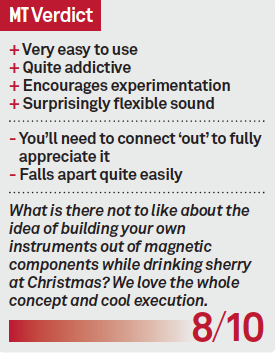littleBits/Korg Synth Kit Review
12 Bits of electronics that fit together to make 500,000 different combinations of synth. ‘Just like synth LEGO,’ says Andy Jones… Details Price: $159 (other kits available – see text) Contact: Via Website Web: http://littlebits.cc We broke the story of Korg and littleBits’ Synth Kit a little too early on MusicTech.net a few weeks ago. […]
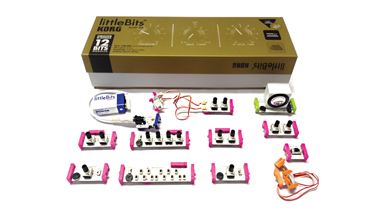
12 Bits of electronics that fit together to make 500,000 different combinations of synth. ‘Just like synth LEGO,’ says Andy Jones…

Details
Price: $159 (other kits available – see text)
Contact: Via Website
Web: http://littlebits.cc
We broke the story of Korg and littleBits’ Synth Kit a little too early on MusicTech.net a few weeks ago. It’s basically a DIY set of easy-connecting components that allows literally anyone – without any knowledge of electronics and synthesis – to build their own synths. We apologised for breaking the story before the embargo but littleBits very kindly sent us one of the first kits to review as a reward for our initial enthusiasm.
And it’s hard not to get enthusiastic about it. Shiny colours? Bits of electronics? Connected together using magnets? Half-a-million combinations? We’re geeky and proud – and at the time of writing it’s coming up to Christmas. What’s not to get excited about?
littleBits is more of a mission than a company. The people behind it have realised that we all spend a lot of time with technology (7.5 hours of ‘passive consumption’ each day, they reckon) yet we all know little about how it works and fits together. This is not a great thing, they believe, and in order to help create a generation of thinkers and innovators the company is breaking down the world of technology into Bits – and lots of them.
The best ‘bit’ (sorry) is that littleBits is open to everyone: “littleBits aims to move electronics from late stages of the design process to its earliest ones, and from the hands of experts to those of artists, makers, students and designers.”
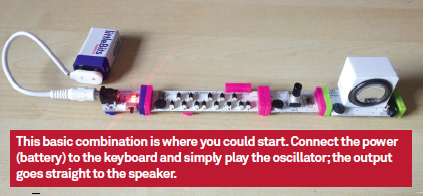
It all sounds rather great, like a technological hippie movement. You use the company’s electronic Bits – modules that so far number around 50 – and link them together to easily create technology-based items – and in doing so, learn how they work. There is a whole community of people out there creating and uploading projects, from a more obvious alarm clock to the less obvious door-closer. And littleBits has created projects too, including a hilarious electric toothbrush and this commercially available Synth Kit, produced in partnership with Korg.
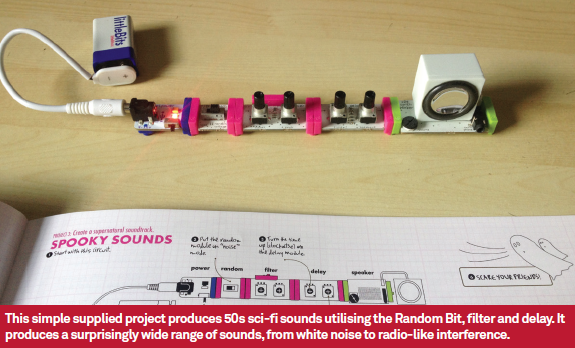
Module types
Before we get into it, let’s look at the Bits modules themselves. So far, four types have been produced: Power, Input, Wire and Output. There are three blue Power modules, including a coin battery and USB. The pink Inputs are the ‘eyes and ears’ of the system. There are more than 20 of these, including a tiny keyboard, a light sensor and an oscillator. The eight orange Wire modules are for branching out and adding more to your creations. Finally, the 13 Output modules include the modules that ‘make stuff happen’ – lights and motors (like a fan), LED and the speaker for the synth. littleBits is adding modules all the time and encouraging people to let them know about any others they would like to see produced (so-called dreamBits).
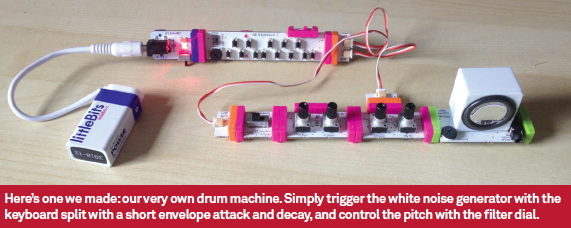
You can buy the Bits individually for between $8 and $36 a piece or buy kits or bundles. There’s a Base Kit that costs $99 (including ten Bits and 150,000 circuit combinations), a Premium Kit at $149 (14 Bits, 600,000 possibilities), and the biggest Deluxe Kit at $199 (18 Bits and a probable infinite number of possibilities!). Finally – and we’re there at last – there’s the Synth Kit, which we have here for review. Consisting of 12 audio-based Bits, we have 500,000 combinations for $159.
The Kit comprises a power source (a Power Bit that allows you to connect the supplied 9v battery), nine Input Bits, one Wire Bit and a Speaker Bit. We’re really interested in the Input Bits, though, as the remaining ones are more or less simply to power and hear whatever instrument you create. You get a keyboard with 13 tiny keys set out in proper keyboard fashion (what can only be described as a nano-keyboard) along with a Filter Bit complete with frequency and cut-off controls, two oscillators with square and saw waveforms plus pitch and tune, a mixer to combine two inputs, a Randomizer for white noise and random pitch generation, an envelope with attack and decay rotaries, a delay effect with time and feedback dials and, finally, a step sequencer (with four parts).
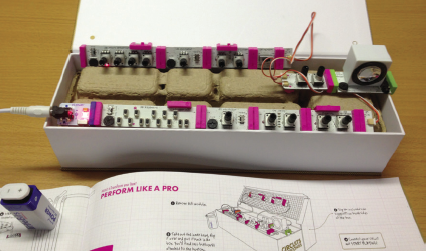
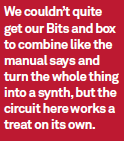
Building blocks
Those of you who are familiar with synthesis will know that these are the building blocks you need to put a synth together, and with the littleBits Synth Kit you literally do just that – it’s synth LEGO! At a very basic level you could simply connect the battery to the oscillator (sound source) and play it by connecting the Keyboard Bit, then connect the speaker to hear it (as shown in Picture 1). Just as easy would be to follow the ten other projects supplied in the (very cool) box. We tried several – see the various boxes in this review – and they all worked a treat, although getting the sequencer to perform was a bit of a chore.
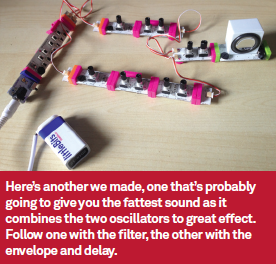
What quickly became apparent was that this is all about ease of construction and destruction. Nothing is designed to be difficult and experimentation is the key – just don’t expect anything to stick around and remain a permanent construct for very long. With that in mind we do have a slight criticism in that if you go beyond half-a-dozen pieces, some of the constructions can get a bit unwieldy and do tend to fall apart. We love the magnetic approach, but wonder if some kind of clip system couldn’t have been utilised to make the connections a little sturdier and more permanent.
As to the sound, it’s never going to compete with a ‘proper’ pro synth utilising the speaker that it does. We tried it out in the MusicTech office and were nearly kicked out by other staff members because of the squealing that ensued. However, don’t let that put you off because connecting it to your own studio setup is well worth doing and certainly beefs-up the sound. We connected it to our mixer using the earphone out and discovered quite a powerful and flexible sound, particularly when utilising the delay and randomizer and in dual-oscillator mode. You might even want to leave record running in your sequencer as you experiment, because you will unearth some great sounds along the way – just don’t expect too much control nor to play along on the keyboard that much as you go.
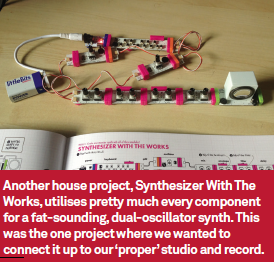
So, great fun indeed, and a surprisingly big sound from a small setup… if you branch out. With Synth Kit, littleBits and Korg certainly are fulfilling their mission to open up technology to everyone and the inner geek in all of us just loves it. Forget the overhyped Xbox 1 and PS4 – this is real innovation, and much more fun
